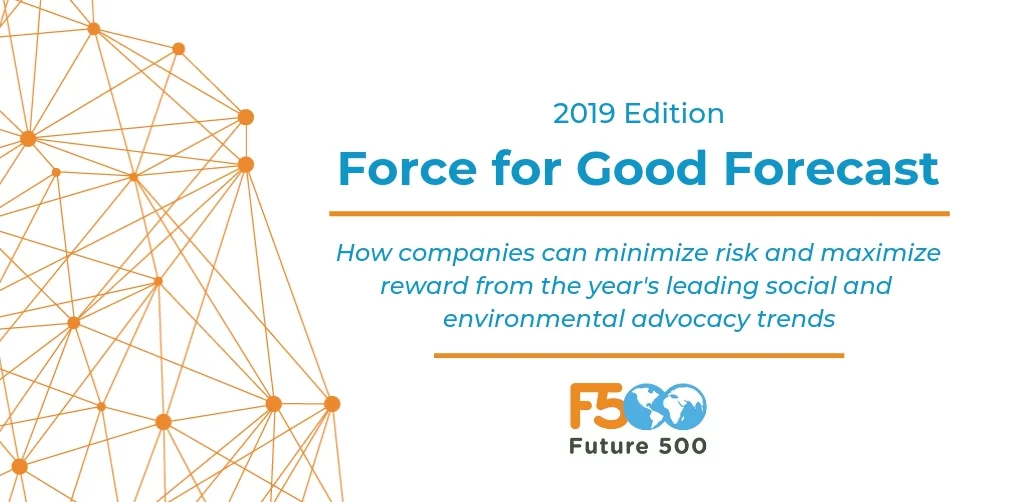The Force For Good Forecast 2019
Future 500’s new handbook helps business leaders minimize risk and maximize reward from the year’s leading social and environmental advocacy trends.
Future 500 is pleased to release The Force for Good Forecast 2019—a handbook that helps leaders ensure that their enterprises will remain a productive force for positive change in what has become a tumultuous business and political climate.
From the evolution of #MeToo, to the growing scrutiny of corporate subsidies, to “whack-a-mole style” environmental enforcement in the developing world, there’s a lot going on out there, and this report sifts and sorts the most important trends and puts them into plain language.
“America’s deepening political divide is driving a few of these shifts, but many reflect subtle changes in philanthropy and demographics that we’ve tracked for years,” said Future 500 Chief Operating Officer Erik Wohlgemuth.
“Some trends are bubbling up from emerging economies, while others flag changing tactics in the environmental-activist community. We curate all these insights and tips into The Force for Good Forecast so that companies can better navigate these dynamics to advance their purpose and sharpen their competitive edge,” Wohlgemuth added.
To produce the The Force For Good Forecast, Future 500 taps in to their extensive network of activists, CSR leaders, philanthropists, and academics, and layers on analysis informed by their deep expertise in stakeholder engagement and NGO advocacy.
This guide to reducing risk flags looming shifts, evolutions, and trouble spots in social movements, corporate advocacy, and technology.
It includes more than 60 specific suggestions on how companies can head off or minimize conflict with their investors, employees, and toughest critics.
Select insights and recommendations include:
Why you might be able to breathe a sigh of relief, even if you aren’t going to meet your 2020 sustainability targets.
How the “Green New Deal” highlights a subset of activists that is rapidly gaining influence in the climate movement.
Why increasing affluence in developing nations is forcing activists to reconsider their tactics, and what it means for companies using their supply chains to drive change.
How and where the #MeToo movement has shifted stakeholder expectations on transparency and diversity data.
What Amazon’s “Retreat from New York” means for companies planning new facilities and infrastructure across America.
Why “plastic activism” is getting personal, and what you can do about it.
This coming month, Future 500 will discuss its findings with representatives of some of the nation’s leading companies and advocates at The Future 500 Summit at EarthX. The invitation-only event is America’s leading gathering dedicated to effective stakeholder engagement. It is held each April in Dallas, Texas, in partnership with the world’s largest environmental conference and exhibition.
Note: We published previous annual editions of the Force For Good Forecast as the “Top 10 Stakeholder Engagement Trends Report” (viewable below).
Corporate Contact: To schedule a private consultation on any of the 10 trends in the forecast: Contact Kellen Klein, Director, kklein@future500.org.
Media Contact: For media inquiries, please contact James Glave, Senior Communications Advisor, jglave@future500.org.
Future 500 is a non-profit consultancy that builds trust between companies, advocates, investors, and philanthropists to advance business as a force for good. Based in San Francisco, we specialize in stakeholder engagement, sustainability strategy, and responsible communication. From stakeholder mapping to materiality assessments, partnership development to activist engagement, target setting to CSR reporting strategy, we empower our partners with the skills and relationships needed to systemically tackle today's most pressing environmental, social, and governance (ESG) challenges.
Want to learn more? Reach out any time.
More from our blog:






















